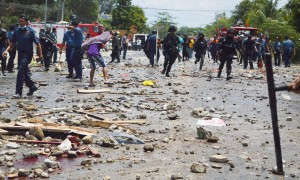CCA condemns police brutality against farmers in Mindanao in the Philippines
[caption id="attachment_1726" align="aligncenter" width="678"] Photo Source: Williamor Magbanua/ AP[/caption]
Photo Source: Williamor Magbanua/ AP[/caption]
Christian Conference of Asia (CCA) condemns the violent response and shootings by the police on farmers in the Philippines and expressed solidarity with the leadership of the United Methodist Church in their continuing protection of some 3,000 farmers and tribal leaders who faced bullet shots by the Philippine National Police.
A group of farmers in Kidapawan, North Cotabato, a Southern island of Mindanao protesting and demanding drought relief from the government were brutally targeted by the police on 1 April. The clash left at least two farmers dead and dozens injured.
CCA General Secretary, Dr. Mathews George Chunakara while condemning the police brutality stated that, “We join hands with those farmers who are struggling for their basic human rights and justice, and urge the government and provincial authorities to provide adequate provisions and security to the people who are legitimately registering their concerns”.
It was during the firing against the protestors that the farmers sought refuge in Scottswood Methodist Centre, and took sanctuary in the Methodist Church compound.
The CCA General Secretary further added that, " We are deeply disappointed that the Governor’s office has threatened the Methodist Bishop Ciriaco Francisco for harboring protestors and the United Methodist Church with legal action in the form of revoking their legal permit”.
The General Secretary has pointed out that, “ It is a known factor that the lumad farmers in the area have been continuously faced with discrimination and persecution. There is no justification for violent oppression as response to the legitimate demands of farmers for their right to food and livelihood”.
CCA’s General Secretary’s full statement can be found here.










